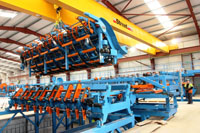

LOCKERBIE: One of Scotland's largest independent sawmillers, James Jones & Sons, is pleased to announce that construction of its new £22.5m state of the art sawmill, at Lockerbie in South Scotland is at an advanced stage. Designed to complement and enhance existing on-site infrastructure and wood processing capabilities the new 'super-site' establishes Lockerbie as one of the UK's largest timber processing sites.
When production begins in Autumn 2009, Lockerbie 3 will have a single shift capacity of 150Km³ sawn, more than doubling the capacity of James Jones's existing sawmill in Dumfries which it will replace. Output from Lockerbie 3 will primarily focus upon carcassing timbers although it will incorporate added flexibility to offer a range of specifications for the construction, fencing, pallet and packaging markets which complement the existing product portfolio.
Lockerbie 3 will also deliver improvements in quality, yield and production speeds, using three dimensional laser technology to scan each log and calculate optimal cutting patterns.
Joint managing director of James Jones and Sons, Ian Pirie comments: "The site is one of the most advanced in Europe, and gives us great flexibility in meeting our customers' future needs. This sizeable investment represents James Jones' firm commitment to British sawmilling and timber processing whilst further enhancing our product range as a group overall."
Mr Pirie continues: "This is the largest single development project the company has undertaken to date and has progressed very smoothly. This reflects the long term partnerships we have with all of our contractors and suppliers. We are confident of opening on schedule in the Autumn with production due to start around 1 October."
Site investment, upon completion of the new sawmill, will total approximately £40m, and the entire Lockerbie complex will employ 90 people working on two high speed saw lines, and a highly efficient secondary processing line.
When fully operational the site's total annual roundwood requirement, sourced from both private growers and the Forestry Commission, will exceed 500 000m3 annually.